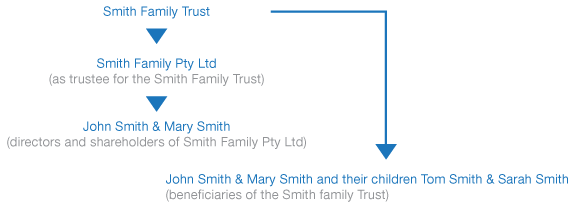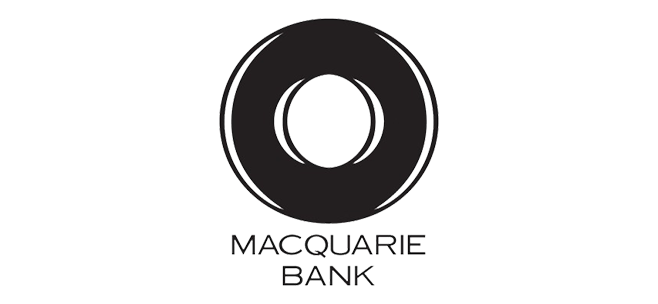In particular we focus on getting the loan structure right the first time, choosing which lenders to use in the right order (yes this is important) and finally getting our clients the best deal possible.
Loans to trusts
What is a trust exactly?
A trust is an arrangement which allows a person or company to own assets on behalf of another person, family or group of people. These people are known as the beneficiaries of the trust. Assets are owned on behalf of “beneficiaries” and are controlled by a “trustee” who can be either a corporation or a natural person. The trustee is governed by a “trust deed” which sets out the rules that the trustee must follow and also covers how profit is distributed to the beneficiaries.

Why borrow through a trust
The two main reasons to consider borrowing through a trust are to protect assets, take advantage of possible tax benefits.
1. Asset protection
Asset protection is probably the biggest attraction of using a trust. Assets held through trusts are not legally "owned" by the trusts beneficiaries, meaning that trust assets are protected from the liabilities of those beneficiaries. Of course, the lender who lends to the trust will always protect themselves by requiring the appropriate guarantees and indemnities. All other creditors will be blocked from going after the assets of the trust though.
2. Tax benefits
The Government introduced the biggest tax advantage in choosing a trust rather than a company when it created a 50 per cent exemption from capital gains tax for all individuals. This exemption was explicitly extended to the beneficiaries of trusts, but not to the shareholders of companies.
Another important tax advantage of using trusts is that it facilitates the tax-free passing of assets between generations. While property can be transferred tax-free upon death by the use of an ordinary will, owners are able to effectively transfer their assets to their children before death by using trusts.
Income splitting - distributing investment income between members of a family to take advantage of lower marginal tax rates - has been partly curtailed. Distributions to children under the age of 18 are now penalised with tax at the top marginal rate. However, the ability to split income between spouses remains.
Typical Family Trust structures
Family trust with corporate trustee

Family Trust with an individual trustee

Trusts that lenders will lend to

There are many types of trusts, but to get a loan care should be taken in choosing which type of trust you go with. Many residential loan brokers and bank employees are not up to speed with trust and company lending and for that reason many lenders do not offer loans to trusts. Many lenders will direct trust borrowers to their commercial lending division which can mean you pay a significantly higher interest rate and fees than you would for a residential loan.
At Mortgage Experts, we are across the various lending policies that relate to trusts and we can help find you the most cost effective solutions. Contact us today to discuss your trust borrowing options.
Discretionary Trusts (including Family Trusts)
A Family Trust is a type of discretionary trust and is the most common trust used by investors. They are generally set up to hold a family’s assets and/or businesses for the benefit of providing asset protection and tax planning for family members. The income and assets from the trust can be distributed to the beneficiaries as the trustee sees fit, as long as the trust deed rules are followed.
If you intend to borrow through a trust we recommend that you use a family trust as this gives you the most borrowing options. Having a personal trustee will allow you more lending options however may offer less in asset protection. Seek advice from a solicitor.
Unit Trusts
A unit trust is like a company where the trust’s property is divided into a number of shares called units. The number of units you hold will determine your entitlement to your share of income, capital gains and voting power. Units in a unit trust can be categorised. For example, you can have income units and capital units. Also unit holders can be individuals, companies or discretionary trusts.
The taxation benefits are generally not as flexible in a discretionary trust, because any income distributions must be distributed to unit holders as per their share of units. However, if a discretionary trust was a unit holder, you can achieve the same flow through tax benefits.
From an asset protection point of view, unit trusts don’t provide the same kind of asset protection as a discretionary trust. If a unit holder is made bankrupt, then that person’s units will be treated like any other assets and sold to raise funds to pay creditors. Unit trusts are most common for non-family members or a blend of family and non-family members.
Residential rate loans to unit trusts are available through a limited number of lenders.
Self Managed Super Fund (SMSF) Trust
A SMSF is a special type of trust that people can set up to manage their own superannuation. Like a normal super fund, your employer contributions still get paid into the fund and you can still make additional contributions as you see fit. Unlike a normal super fund, the trustee (normally you) has direct control over the assets that your superannuation is invested in.
A select few lenders now offer loans to SMSF trusts to allow them to invest in residential property up to an LVR of around 70%. The interest rates offered are around the normal home loan rates + a margin of around 0.5% - 1.0% pa.
The borrowing structure is usually set up as follows:
- A loan is given to the SMSF Trustee.
- A “Security Custodian” purchases the residential investment property on behalf of the super fund. This security custodian (which must be a limited liability company) then holds the property as an asset in trust for the super fund.
- The super fund has the beneficial right (but not the obligation) to acquire the underlying asset at a future date when the loan is repaid.
- The loan is secured against the investment property. While the loan is ideally self-servicing from the rental income derived from the property, servicing may also come from any other income received or assets held by the SMSF Trustee.
- The loan is limited in recourse, with the Bank’s right against the SMSF Trustee limited to the lenders right as mortgagee in relation to the property.
- There is no recourse to any other assets of the SMSF, or to either the SMSF Trustee or Security Custodian.
The tricky point here is that although they say the loan is non-recourse, lenders being lenders can’t help trying to get more security. So most require director’s guarantees from the security custodian. In most cases this just so happens to be the beneficiary of the super fund!
If lenders don’t take the director’s guarantees, the LVRs offered are normally lower and the interest rates higher. This is a really grey area, so seek independent advice before committing.
Hybrid Trusts
Hybrid trusts are trusts that combine features of discretionary and unit trusts. Nearly all lenders will not lend on home loan terms to a hybrid trust. At the time of writing we know of only two lenders who will lend to a hybrid trust.
Are you looking to borrow in a trust? Talk to the experts first
Our Current Lender Panel










































